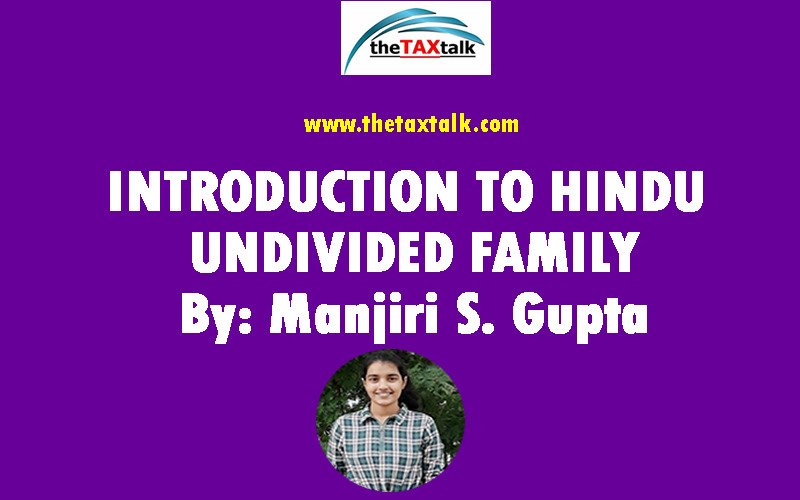![]()
INTRODUCTION TO HINDU UNDIVIDED FAMILY By: Manjiri S. Gupta
(The author is an Article Assistant at SSRPN & CO. Nagpur. She can be approached at cassrpn@gmail.com)
According to the Income Tax Act 1961, Hindu Undivided Family commonly known as HUF is a separate entity from its members for the purpose of assessment. The term is defined under the Hindu Law as a family consisting of all persons lineally descended from a common ancestor and including their wives and unmarried daughters.
There are some essential conditions to be fulfilled to form HUF, they are:
-
One should be Hindu, Jain, Sikh, Buddhist but not Muslims or Christians;
-
There should be a family;
-
They should be undivided i.e. living jointly or having some commonness among them.
All these 3 conditions are cumulative conditions.
HUF consist of Karta, co-parceners and members. Karta is the head of the family. The eldest co-parcener of the HUF is the Karta of the family. In case of the demise of the Karta, the eldest surviving co-parcener in the family automatically becomes the Karta. On 9th September 2005 Hindu Succession Act was amended which gives the daughter of HUF whether married or not, will get the same status as that of a son. Therefore, after this amendment daughters, whether married or not is a co-parcener like a son. Co-parcener have the right to become Karta of the HUF. Whereas, members have the right to received their share at the time of partition but do not have the right to seek for partition or become Karta of the HUF.
It must be noted that HUF is recognized all over India except in the state of Kerala, by virtue of the ‘Kerala Joint Hindu Family System (Abolition) Act, 1975’, from 1976.
Residential status of HUF:
-
Resident: If affairs are controlled and managed wholly or partly in India then HUF is a resident.
-
Non Resident: If affairs are controlled and managed wholly from outside India then HUF is a non resident.
-
Not ordinarily Resident: If Karta or manager satisfies one or both of the additional conditions of section 6(6) then it is NOR.
There are some of the advantages and disadvantages of forming a HUF they are:
Advantages of HUF are:
-
The major benefit of forming an HUF is that, it provides an additional PAN which can be used to save tax by splitting the income.
-
An adopted child can also become part of the HUF .
-
Members of an HUF can easily avail loans.
-
Two PAN cards can be created and each of them can file the taxes separately.
Disadvantages of HUF are:
-
All the members of HUF have equal rights on the property.
-
HUF is losing its amenity of a tax saving tool because of its joint family issues.
-
Closing a HUF is difficult as there are a lot of legal formalities.

